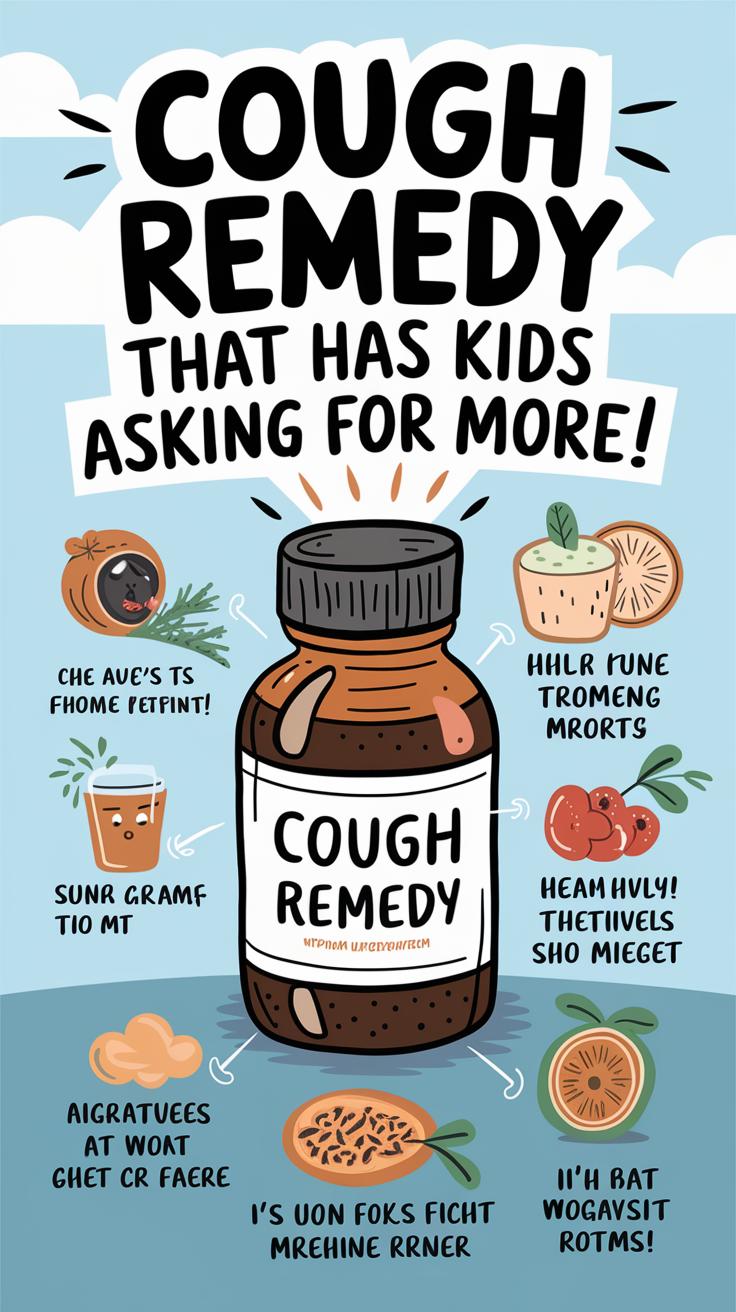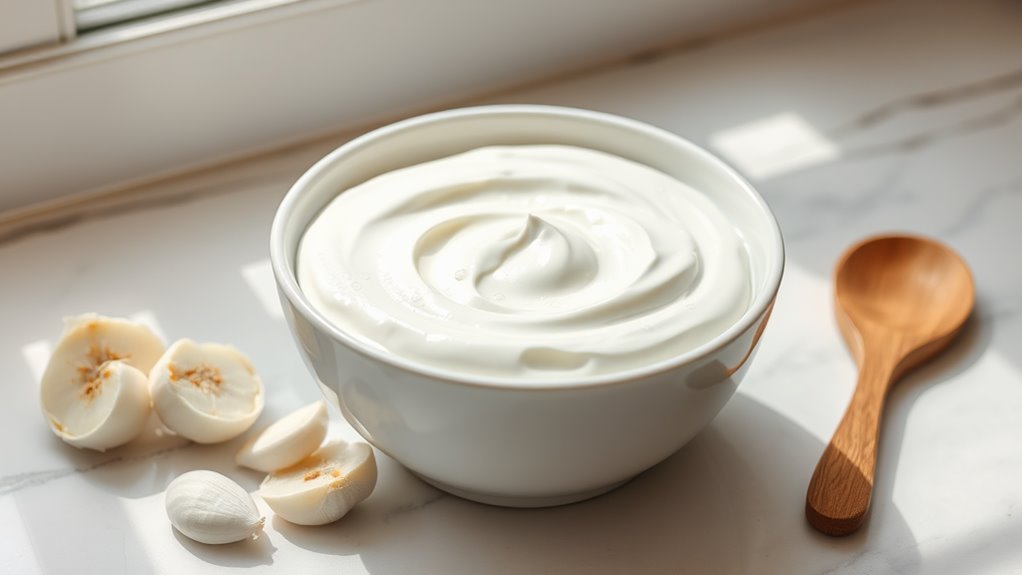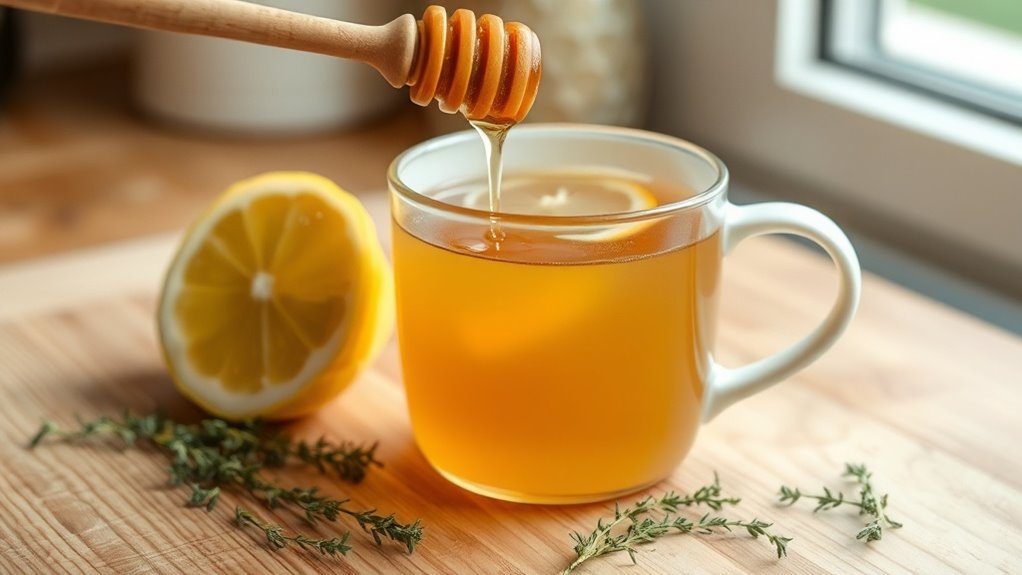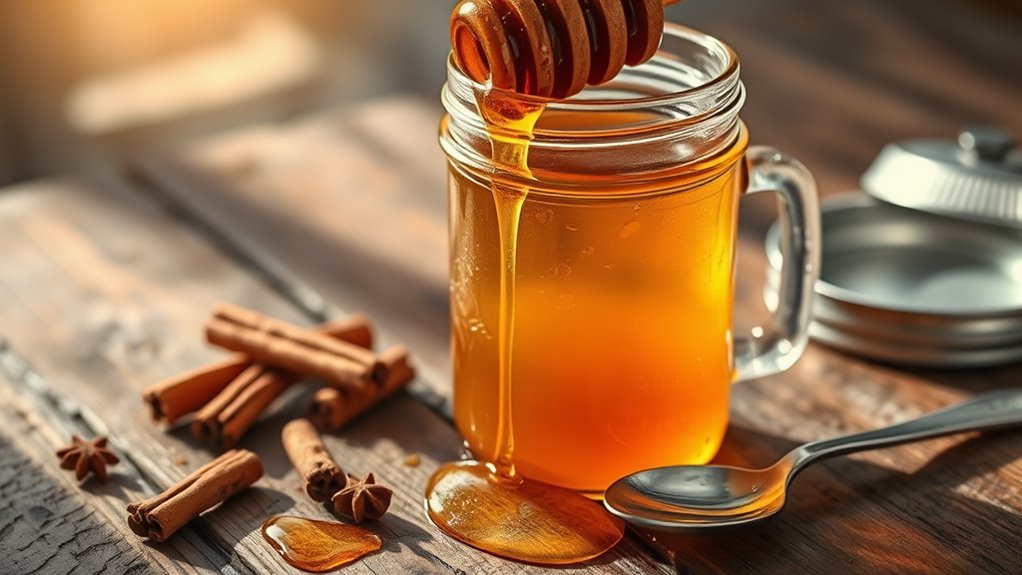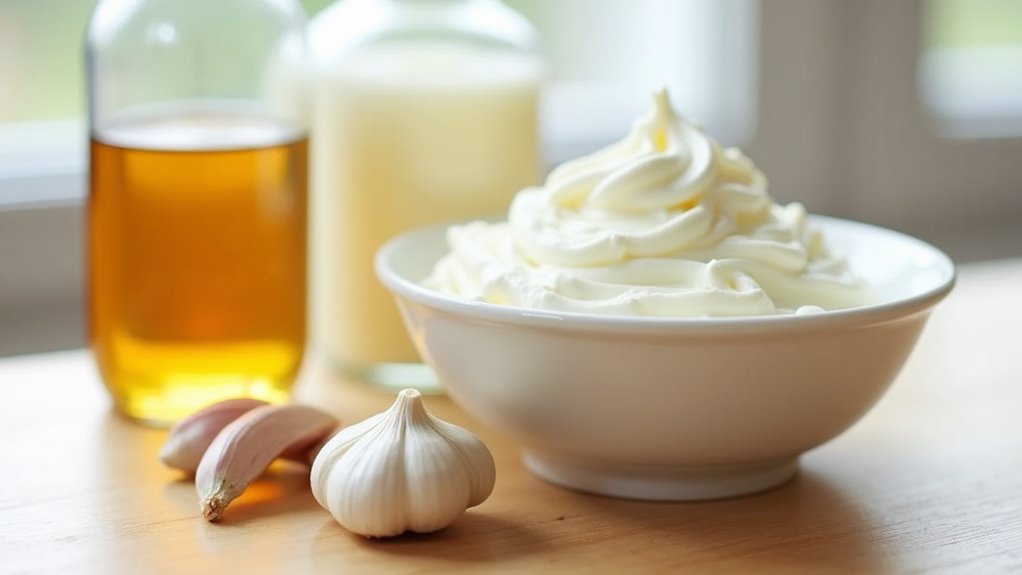Cough Remedy That Has Kids Asking for More!
Transform your child’s cough medicine struggles into fun healing moments with natural, tasty remedies. You’ll win them over by serving honey-based syrups in colorful silicone molds, creating bear-shaped ice pops, or brewing “magic healing tea” in their favorite mug. These kid-approved alternatives combine powerful ingredients like honey, ginger, and elderberry with playful presentations. Discover how simple kitchen ingredients can make medicine time your child’s new favorite activity.
Key Takeaways
-
Create fun-shaped honey pops by freezing honey-based mixture in colorful silicone molds shaped like bears or stars.
-
Mix honey with natural fruit juices in themed “magic healing” mugs decorated with favorite cartoon characters.
-
Make sweet elderberry syrup gummies using natural gelatin and pour into entertaining animal-shaped molds.
-
Blend honey, lemon, and ginger into a tasty “superhero smoothie” served in special character cups.
-
Turn thyme-infused honey into delicious lollipops by adding natural food coloring and fun stick designs.
Why Traditional Cough Medicines Fall Short
Although many parents reach for over-the-counter cough medicines when their child is sick, research shows these traditional remedies often don’t help children under 12.
You’re not alone if you’ve noticed your little one’s cough persisting despite trying various medications.
Most traditional cough remedies for kids contain ingredients like dextromethorphan and guaifenesin, which haven’t proven effective in clinical studies.
What’s more, these medicines can cause drowsiness, upset stomach, and in some cases, serious side effects.
The American Academy of Pediatrics now advises against using these medications for young children.
You’ll find better results with natural alternatives that soothe your child’s throat and boost their immune system.
Plus, these gentler options don’t come with the risks associated with conventional medicines.
The Power of Natural Ingredients
While pharmaceutical companies market synthetic solutions, nature provides powerful ingredients that can effectively calm your child’s cough. You’ll find that honey, known for its antimicrobial properties, coats and soothes irritated throats while suppressing cough reflexes.
Ginger’s natural anti-inflammatory compounds help reduce throat swelling and ease breathing difficulties.
Like many parents in our community, you can also rely on elderberry’s immune-boosting properties and thyme’s expectorant qualities to help your little one recover faster.
Lemon provides vitamin C and helps break up mucus, while warm water with a pinch of turmeric creates a healing drink your kids will actually enjoy.
These natural ingredients work together to provide relief without the side effects commonly associated with over-the-counter medications.
Honey: Nature’s Sweetest Medicine
Honey stands as one of the most effective natural cough remedies for children over age one.
You’ll find this golden elixir works wonders by coating irritated throats and suppressing those nagging nighttime coughs that keep your little ones awake.
Like many parents in our community, you can trust honey’s natural antimicrobial properties to help fight infections while soothing your child’s discomfort.
Just give your child two teaspoons of raw honey before bedtime – it’s that simple!
Studies show it’s even more effective than some over-the-counter medicines.
Fun Shapes and Creative Presentations
Since getting kids to take medicine can be challenging, transforming remedies into fun shapes and creative presentations makes the experience more enjoyable.
You’ll find your little ones more cooperative when you serve honey-based cough syrup in colorful silicone molds shaped like their favorite animals or characters. Try freezing honey-lemon mixture into bear-shaped ice pops or creating star-shaped honey lozenges.
Get your children involved by letting them choose their special “medicine cup” from a selection of fun containers with silly straws or character designs.
You can also make “magic healing tea” by adding honey to warm herbal tea in their favorite themed mug. These playful approaches turn medicine time into a positive experience, helping your kids feel more in control and less anxious about taking their remedies.
Kid-Tested Flavor Combinations
Three kid-approved flavor combinations make natural cough remedies more appealing to young taste buds.
You’ll find that mixing honey with fresh lemon juice and a dash of cinnamon creates a warm, comforting blend that kids love. For a cooling option, combine natural mint extract with honey and a splash of coconut water – it’s invigorating and soothing for scratchy throats.
Your little ones will also enjoy the sweet-tart combination of fresh orange juice, honey, and ginger. These flavors not only mask the medicinal taste but also provide additional health benefits.
You can adjust the ratios to match your child’s preferences, making them feel special with their own “custom blend.” Parents in our community report that these combinations have transformed medicine time from a struggle into an enjoyable experience.
Herbal Solutions Made Delicious
Transforming traditional herbal remedies into tasty treats makes them more appealing to children while maintaining their therapeutic benefits.
You’ll find that combining honey with herbs like thyme and elderberry creates a sweet syrup that kids actually enjoy.
Try mixing chamomile or peppermint tea with fresh lemon and a touch of maple syrup for a soothing drink they’ll request again.
You can also create fun “medicine pops” by freezing herbal tea with honey and fruit juice.
Your little ones will love these natural remedies disguised as special treats.
Consider adding a drop of food-grade essential oils like vanilla or orange to mask stronger herbal flavors.
Remember to store these kid-friendly concoctions in colorful containers with fun labels, making the healing experience more engaging for your child.
Safety Guidelines for Parents
While making natural remedies appealing to children is important, following proper safety guidelines secures their well-being.
Always consult your pediatrician before introducing any new remedy, even if it’s natural. You’ll want to verify there aren’t any allergies or interactions with other medications your child might be taking.
Store your homemade remedies in clearly labeled containers with preparation dates, and keep them out of children’s reach.
You’re part of a community of caring parents, so remember to check expiration dates of ingredients and never exceed recommended dosages.
If your child’s cough persists beyond a week or is accompanied by fever, it’s time to visit your healthcare provider.
Trust your parental instincts – they’re usually right when something doesn’t seem normal.
Age-Appropriate Dosing Tips
Determining the right dose for your child’s age and weight is essential for safe and effective cough relief.
You’ll want to carefully read the label of any medication and follow the age-specific guidelines provided. For children under 4, always consult your pediatrician before giving any cough medicine.
If you’re using liquid medication, use the measuring device that comes with it – never household spoons.
For kids 4-6 years old, stick to 2-5ml doses every 4-6 hours. Children 6-12 can typically take 5-10ml, while those over 12 can follow adult dosing.
Don’t increase the dose if symptoms persist – instead, call your doctor.
Making Medicine Time an Adventure
Getting your child to take medicine doesn’t have to be a battle of wills. You can transform this daily routine into a magical experience that your little one will actually look forward to.
Turn medicine time into a superhero moment by creating a special cape for your child to wear. Let them choose their favorite cup or spoon, and make it their dedicated “medicine helper.”
Add excitement by counting down together or singing a special medicine-time song. You can even create a reward chart with stickers for each successful dose.
Consider role-playing with stuffed animals who also “take their medicine” or telling short stories about brave knights who stay healthy with their special potions.
Soon, you’ll find your child enthusiastically participating in this new adventure.
Quick and Easy Recipe Ideas
Natural homemade cough remedies can provide quick relief for your child without the side effects of over-the-counter medications.
You’ll love these family-tested recipes that other parents trust for their little ones.
Mix 2 tablespoons of honey with warm lemon water for a soothing drink that coats irritated throats. For children over age one, add a pinch of ginger to boost its effectiveness.
Another parent-approved recipe combines 1/4 cup of apple cider vinegar with 2 tablespoons of honey and a dash of cinnamon.
For a cooling chest rub, blend 2 drops of eucalyptus oil with 2 tablespoons of coconut oil.
You’re joining countless other caring parents who’ve discovered these gentle, effective solutions.
Remember to store your remedies in airtight containers and always consult your pediatrician first.
Storage and Shelf Life
To keep your homemade cough remedies safe and effective, proper storage is essential. Store your mixture in an airtight glass container and keep it in your refrigerator, where it’ll stay fresh for up to two weeks.
You’ll want to avoid plastic containers, as they can affect the taste and quality of your natural remedy.
Like many of us who make natural remedies, you’ll notice a dark color developing over time – that’s completely normal. However, if you spot any mold or detect an off smell, it’s time to make a fresh batch.
When you’re ready to use it, just give the container a gentle shake to mix any settled ingredients. Remember to label your container with the date you made it, so you’ll always know when it’s time for a new batch.
When to See a Doctor
While home remedies can provide relief for mild coughs, certain symptoms require immediate medical attention. If your child’s cough persists for more than two weeks, is accompanied by difficulty breathing, or includes wheezing, you’ll need to consult your pediatrician right away.
Don’t wait to seek medical help if you notice your child has a high fever (over 102°F), is coughing up blood or thick green mucus, or appears unusually lethargic.
Other concerning signs include a barking cough with stridor, severe chest pain, or signs of dehydration. Many parents face similar situations, and it’s always better to err on the side of caution.
Common Ingredient Substitutions
Parents often need substitutes for common cough remedy ingredients when treating their child’s symptoms at home. You’ll find these alternatives just as effective and likely already in your kitchen.
| Original | Substitute | Ratio |
|---|---|---|
| Honey | Agave Nectar | 1:1 |
| Lemon | Apple Cider Vinegar | 2:1 |
| Ginger Root | Turmeric Powder | 1:2 |
| Thyme | Oregano | 1:1 |
If your little one doesn’t like honey’s texture, try smooth agave nectar. When lemons aren’t available, apple cider vinegar provides similar antimicrobial benefits. Fresh ginger can be replaced with turmeric powder, which many kids prefer since it’s less spicy. Oregano makes an excellent stand-in for thyme, offering comparable soothing properties for scratchy throats.
Seasonal Remedies for Year-Round Care
Since different seasons bring unique challenges for children’s coughs, you’ll need to adjust your home remedies throughout the year.
In winter, warm honey-ginger tea helps soothe cold-induced coughs, while spring calls for local honey to combat allergy-related throat irritation. You’ll find elderberry syrup particularly effective during flu season.
Summer’s heat can trigger post-nasal drip, so keep cucumber-mint water on hand to maintain hydration and reduce coughing.
For fall’s dry air, a bedroom humidifier with eucalyptus oil works wonders. Store these seasonal ingredients in your pantry, and you’ll always be ready to comfort your little one.
Remember to label and date your homemade remedies, and keep track of which combinations work best for your child’s specific needs.
Mixing Fun With Function
Making medicine time enjoyable can transform a challenging task into a positive experience for your child. You’ll find that creative presentation makes all the difference in getting your little one to take their cough remedy willingly.
Try serving honey-based remedies in colorful medicine cups, or freeze herb-infused popsicles that soothe sore throats while feeling like a treat.
Turn dosing time into a game by pretending the medicine spoon is an airplane coming in for a landing. You can also let your child pick their favorite cup or choose between approved flavors.
Remember to praise their cooperation and maybe offer a small reward, like a sticker or extra storytime.
These simple touches help build trust and make future medicine moments much easier.
Building Healthy Habits
Beyond treating occasional coughs, you’ll want to establish daily routines that enhance your child’s immune system.
Start by making handwashing a fun ritual before meals and after playtime. You’re not alone – many parents turn this simple task into a game with songs or challenges.
Create a bedtime schedule that guarantees your little one gets 9-11 hours of sleep, as rest strengthens natural defenses.
Include immune-supporting foods like colorful fruits and vegetables in their daily meals. Make it exciting by letting them help prepare simple dishes or choose produce at the grocery store.
Don’t forget about regular exercise – encourage outdoor play when weather permits.
Moving their bodies helps circulate immune cells and builds stronger respiratory health. Plus, fresh air and sunshine provide natural vitamin D.
Parent Success Stories
Real parents have found remarkable success with these healthy habits and natural remedies.
You’ll join countless others who’ve discovered that honey-based cough remedies work wonders for their little ones. Sarah from Ohio reports her 6-year-old now reminds her about their bedtime honey routine, while Mike’s kids in Texas actually look forward to their natural cough syrup.
You’re not alone in wanting the best for your children. Parents in our community share how their kids have gone from fighting medicine to requesting these natural alternatives.
“My daughter used to run away at the sight of cough syrup,” says Jennifer, “but now she asks for her special honey mix.”
These success stories show you’re making the right choice for your family’s health.
DIY Medicine Making Tips
You’ll find that crafting homemade cough remedies is simpler than you might think. Just like countless other parents who’ve joined the natural remedy movement, you can create effective solutions in your own kitchen.
Start with clean, sterilized equipment and fresh ingredients. You’ll want to measure precisely – even natural medicines require exact portions.
Store your remedies in dark glass bottles to protect them from light degradation, and always label them with the date and ingredients. Don’t forget to add “shake well before using” if you’re mixing oil-based ingredients.
Keep your workspace clean and organized, and remember to strain any herbal mixtures through cheesecloth before bottling.
When stored properly in the refrigerator, most homemade cough syrups stay fresh for about two weeks.
Frequently Asked Questions
Can These Remedies Interact With Prescription Medications My Child Is Taking?
You’ll want to check with your child’s doctor or pharmacist about any potential interactions between remedies and current medications to guarantee your little one’s safety and well-being.
How Long Should I Wait Between Doses of Natural Cough Remedies?
You’ll want to wait 4-6 hours between doses of natural remedies. If you’re using honey or herbal teas, it’s best to space them like regular medicines for ideal effectiveness.
Are These Remedies Safe for Children With Diabetes or Sugar Restrictions?
You’ll need to check with your doctor before giving natural remedies to diabetic children. Many contain honey or sugar, so it’s best to find sugar-free alternatives specifically approved for their condition.
Do Natural Cough Remedies Work as Quickly as Over-The-Counter Medicines?
While natural remedies can be effective, they typically work more gradually than OTC medicines. You’ll want to give them more time to build up in your system for best results.
Can I Prepare These Remedies in Advance and Take Them While Traveling?
You can prepare many natural cough remedies ahead of time. Store honey mixtures and herbal teas in sealed containers, but make fresh ginger or citrus blends just before your trip for best results.


